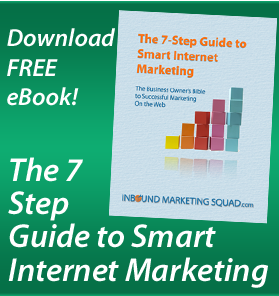 At the most fundamental level a brand is a promise.
At the most fundamental level a brand is a promise.
Keeping a brand promise to customers, employees, vendors/suppliers and partners is good business 101. (You'd think it would be common sense, but I can't tell you how many business owners and marketers I meet who, for whatever reason, have missed this lesson.)
Every time we keep our brand's promise, we make a deposit into our brand bank. A robust brand bank account gives our company leverage.
If we pay our bills as promised, that leverage translates into more favorable discounts or payment terms with our vendors.
If we treat employees the same way we want them to treat our customers — our employees will go the extra mile [or not] to make our customers happy.
If we consistently deliver products or services as promised to customers and partners, that leverage transforms into positive word-of-mouth and rabid fans who tell others how reliable / great / fantastic our product and our company are and sales go up.
Beware of Broken Brand Promises
Whatever our brand promise is, when we violate it, we take money out of our "brand bank." Even if we're Apple.
Look at Apple's recent iPhone 5 intro. Yes, its Maps application needs a lot of improvement (an understatement), and its stock price has dropped from the low $700s/share to about $589/share, but the iPhone 5 is now outselling the Android according to one recent study by Kantar — the strongest indicator of the power of Apple's brand — clearly showing how much forgiveness / leeway customers are giving Apple.
As a rabid Apple fan (and former employee), I'm waiting anxiously (are you?) to see what Apple will do to recover from its brand promise of delivering insanely great, beautiful, easy-to-use, innovative products. I'm betting Apple will rebound from this just as it did when it released Siri (the intelligent voice agent) before all the bugs were worked out. But time and Apple's actions will tell.
And I grant you — you and I aren't Apple.
But branding is just as relevant and important to small business owners
From the first day we opened our doors for business, knowing what we stand for, what our brand promise is, is crucial to the long-term health of our firms. Because if we don't know what our brand promise is, neither will our employees, customers, partners or vendors.
Employees won't know what, when, why or how to deliver products and services, work with each other, engage with partners and vendors.
Prospects won't understand what we're offering and as you know, a confused mind says "no". So they don't become customers.
Vendors and partners won't know what to expect from us — how to work with us or why they even should.
As business owners we must:
- Stake a claim about what our brand promise must be
- Do our best to help everyone at our company keep that promise all of the time
- Immediately and permanently fix any problem that erode our brand's bank account
for the sake of our firm's long-term health.
So if Bill, our lead sales rep, doesn't return calls within the 8 business hours he says he will in his outgoing voicemail message, that's a broken promise. If our company offers an unconditional money back guarantee and we tell our customer service people not to refund a customer's money, that's a broken promise. If we want our brand to stand for durability and reliability, and our customer calls to say the product we sold her stopped working, that's a broken promise. If we want to be considered a thought leader yet fail to provide insightful commentary, analysis or information to our followers, how long will it be before they desert us for someone who does all of that?
Isn't "branding" just an excuse to spend money on trifles?
Our brand's promise is often called a positioning statement by marketing nerds like me. And many would-be "branding" experts focus mostly on the visual expressions of the brand because that's the easy part (logo, tagline/slogan, t-shirts, website, brochures), the part that's tangible. The part that most small business owners are willing to pay for because it's a quick fix, a visible fix that makes us feel like we've accomplished something important. But in the end, that's like the old saying "Even if you slap iipstick on a pig, it's still just a pig."
The process of (re)discovering our brand's promise can be joyously painful. Having an external, objective resource to help us manage this process is essential to getting it right. We're all too close to our own brands to be able to see it as our customers do. Because the reality is our customers are the ones who define what our brands stand for [or not] — whether we like the results, or not.
The hard work is figuring out our brand's promise and committing to making it a reality. Committing to a long-term path of believing that although our brand doesn't stand for that today, we're gonna make sure it does in the coming years.
Remember the '50s, '60s and '70s that when anything that said "Made in Japan" was a joke? We would all roar with laughter because we knew that whatever it was would be a piece of junk that fell apart. Who figured out how to make a brand promise and keep it? Toyota? Honda? Lexus? Acura? Sony? Canon? Nikon? Panasonic? Mitsubishi? Who's laughing now?
We Need to Understand What Our Customers Believe About Our Brand
There are as many ways to determine what your brand's positioning is as there are drops of water in the sea. Having an experienced and successful partner by our side to help us figure out the path that works for us is important. Because our brand's promise will drive our company's overall business strategies. "Branding" is not just something we marketing nerds thought up to drive our colleagues in Finance or IT crazy. Really. It isn't.
For instance, if our brand promises that our product/service will do what we say it will and back that promise with an unconditional money back guarantee — that implies that anyone can ask for their money back if they're not satisified for any reason. ANY reason. Such a guarantee implies that our product or service will deliver the benefits we promised. Which in turn means our product or service better be top notch quality, delivered on time, no hassle ordering, no hassle returns, great customer service, good value, etc.
Branding is not about a pretty logo, a memorable tag line/slogan, a nice looking website, terrific t-shirts, a cool neon sign or a video. Those are merely the most tangible expressions of what a brand's PROMISE stands for.
And no amount of beautiful brand wrappings, messages and cool videos, golf games at Pebble Beach or fun parties at trade shows will ever, ever make up for a brand's broken promises.
What's Your Brand's Promise?
So here's your challenge:
- What's your brand's promise?
- When anyone in your company (including you), fails to keep your brand's promise, how will you make it right?








